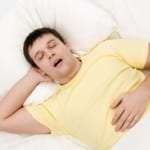 Sleep apnoea is a sleep disorder that can potentially be very serious. It causes disrupted breathing as a result of the airway becoming blocked when you sleep. If you’re suffering from sleepless nights and you’re not sure why, here are six signs of sleep apnoea to look out for:
Sleep apnoea is a sleep disorder that can potentially be very serious. It causes disrupted breathing as a result of the airway becoming blocked when you sleep. If you’re suffering from sleepless nights and you’re not sure why, here are six signs of sleep apnoea to look out for:
- Gasping for breath and shortness of breath: if you struggle to breathe while you are asleep, you may find that you wake yourself up gasping for air and experience shortness of breath. Your partner may also spot this if you fail to wake up.
- Snoring: snoring is not the same as sleep apnoea, but it is often symptomatic of the disorder, particularly in cases where snoring is loud and persistent.
- Loud, heavy breathing: sleep apnoea makes it difficult to breathe and this often means that breathing sounds heavy and laboured.
- Feeling tired during the day: sleep apnoea disrupts sleep, which affects your quality and quantity of sleep and may make you feel tired and lethargic during the day. Often, people who have sleep apnoea feel like they’ve not slept well when they wake up in the morning.
- Night sweats: waking during the night needing to urinate and night sweats may be symptomatic of sleep apnoea.
- Headaches: headaches, particularly in the morning, may be a sign of sleep apnoea.
Treating sleep apnoea
In many cases, there are lifestyle factors that contribute to sleep apnoea and making positive changes such as losing weight, doing more frequent exercise, giving up smoking and cutting down alcohol intake during the evening can help. We also provide custom-made devices to open up the airway while you sleep. These appliances, known as mandibular advancement devices, move the lower jaw forward slightly, which ensures the airway remains open and increases airflow.
If you recognise some of the symptoms listed above and you think you may have sleep apnoea, call us today to book an appointment.











